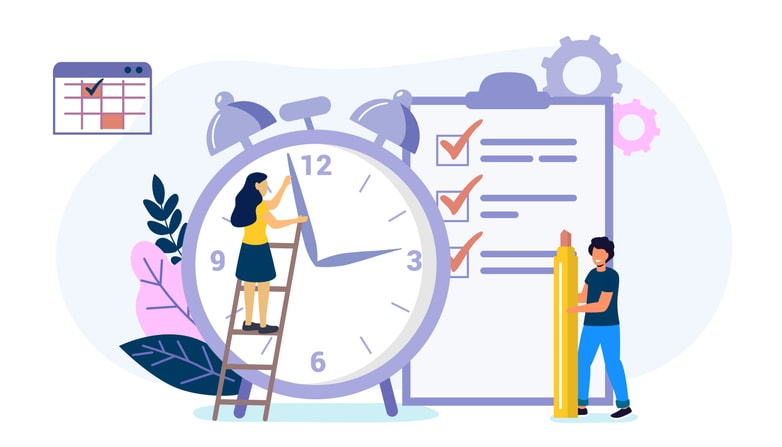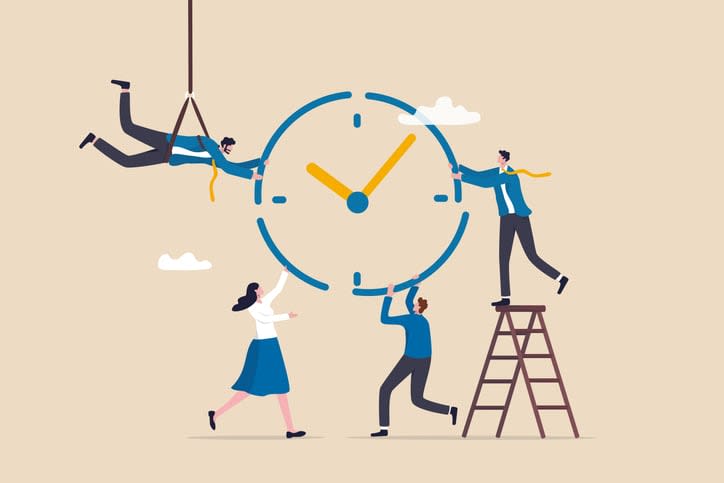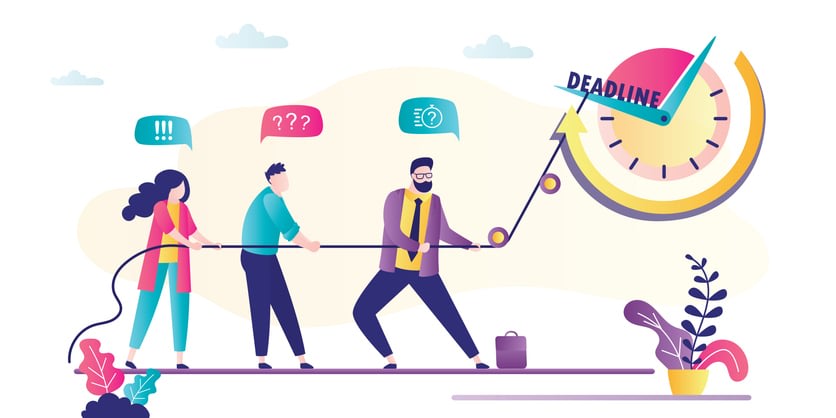Struggling with wasted time? ‘You waste’ moments are often unnoticed but can accumulate significant productivity loss. This article cuts straight to identifying these leaks in your routine and seals them with practical, proven strategies. No fluff, just effective steps to optimize your time for professional success and personal fulfillment.
Key takeaways
- Addressing time waste is crucial for productivity and work-life balance, requiring identification of common time wasters like multitasking and meetings, which can cost businesses billions annually.
- Kumospace is a virtual workspace tool that enhances team collaboration and reduces time waste, providing features like app integration and advanced analytics to foster productivity and reduce meeting inefficiencies.
- Reducing time waste involves prioritizing tasks, streamlining processes, creating distraction-free environments, and building a team culture of trust and accountability, while personal management skills can benefit from adaptability, reflection, and learning from experience.
Understanding time waste: the hidden culprit

Time is the one resource we all have in equal measure, but how we use it can make a world of difference. Time management involves planning and control to maximize productivity. In the modern work environment, it’s not just a nice-to-have; it’s a lifeline for professional success and personal fulfillment.
Yet, there’s an unseen enemy lurking in the shadows, silently draining our valuable time. It’s called time waste, and it’s a silent productivity killer. Effective time management directly improves work-life balance, allowing us to make the most of our working hours. But to combat time waste, we first need to identify it.
Identifying time wasters
You’ve probably experienced this before: You sit down to work, open your social media for a quick check, and before you know it, an hour has passed. This is just one example of common time wasters that hinder productivity. Procrastination, perfectionism, and multitasking are others that can silently eat away at our precious hours.
So, how do we tackle these productivity vampires? The answer lies in effective organizational skills. By organizing our tasks efficiently, we can significantly reduce the amount of wasted time and transform our workdays into productive powerhouses.
The cost of time wasted
The cost of time waste goes beyond mere minutes lost. It can lead to missed deadlines, lower-quality work, and even missed opportunities for personal growth and career advancement. Did you know that employees spend an average of 31 hours per month in meetings, with around half of this time seen as wasted?
Shocking, isn’t it? Senior managers consider 71% of these meetings to be unproductive and inefficient. The estimated financial cost of unproductive meetings in the United States is a staggering $399 billion annually. From small organizations with fewer than 50 employees wasting approximately $18,000 per year, to large organizations with over 100 employees wasting around $420,000 annually, time waste is a costly affair.
Kumospace: your ally against time waste
Recognizing the challenge of time waste, Kumospace has emerged as a powerful ally. This platform provides a virtual workspace optimized for remote and hybrid teams, facilitating better collaboration. As a tool for virtual meetings, it has earned high acclaim, demonstrating its effectiveness and reliability for team collaboration.
But Kumospace isn’t just another virtual platform. It’s engineered to maximize productivity and combat unproductive behaviors in the workplace. By leveraging the capabilities of Kumospace, you can turn the tide against time waste and reclaim your valuable hours.
Key features of Kumospace
One of the distinct features of Kumospace is its interactive capabilities. It fosters team collaboration through online whiteboards, and digital games, and even celebrates team milestones with customizable spaces such as gongs and birthday cakes. This unique approach not only boosts engagement but also makes the virtual workspace more enjoyable.
Kumospace offers the following features:
- Integration with commonly used apps, enhancing the overall virtual workspace experience
- A suite of desktop and mobile apps designed to support remote and hybrid teams, compatible across multiple operating systems
- Tools and strategies to combat unproductive behaviors, promoting efficient work habits
By utilizing these features, Kumospace assists in enhancing overall time net gains and promotes efficient work habits.
Real-life success stories
So, does Kumospace really deliver? The answer is a resounding yes. Two out of three workers have reported feeling more productive when working remotely, thanks to the aid provided by Kumospace.
But it’s not just about individual productivity. Kumospace’s advanced analytics features grant visibility into team activities, which aids in more efficient time management. The result? Teams achieve more in fewer hours, reflecting its effectiveness in productivity enhancement.
Practical tips for reducing time waste

Armed with the right tools like Kumospace, it’s time to tackle time waste head-on with some practical strategies. Cultivating effective time management skills involves experimenting with various methods, reflecting on outcomes, and adopting practices that best suit individual needs and environments.
Learning from past experiences allows individuals to recognize patterns, learn from successes and failures, and enhance their approach to managing time. Now let’s dive deeper into these practical tips, starting with prioritizing tasks and commitments.
Prioritizing tasks and commitments
Picture this: You’re faced with a mountain of tasks, and you’re not sure where to start. This is where prioritization comes in. The ‘Eat That Frog’ method suggests that by starting with the most difficult and important task (‘eating the frog’), the rest of the tasks will seem easier in comparison.
Another effective method is the ABCDE Method for task prioritization, which categorizes tasks into five levels of priority, from highest (A) to tasks that can be eliminated (E). To keep track of tasks and effectively prioritize them, it’s also helpful to write down to-do lists, rank tasks by importance, and revisit these lists regularly.
Streamlining processes and services
Streamlining processes is another effective strategy for reducing time waste. Project management tools like Teamwork.com enable the streamlining of processes through features such as easy scheduling, task assigning, and progress tracking, enhancing adaptability and efficiency.
Communication platforms like Slack also contribute to streamlined workflows and efficient teamwork. Regular check-ins and empowering team members to request help when needed are key practices for fostering collaboration and accountability. Another effective approach is batch processing, which involves grouping similar tasks to work on them collectively, enhancing efficiency and reducing time waste.
Creating a distraction-free environment
In the age of constant notifications and online distractions, creating a distraction-free environment is more important than ever. Turning off notifications on phones or using silent modes can help to create a distraction-free workspace, promoting better focus and concentration.
Some tips for enhancing productivity include:
- Allocating specific times of the day to manage social media and emails to reduce interruptions
- Keeping the number of open tabs and documents to only what’s necessary for the current task to maintain focus
- Writing down unplanned tasks and assessing their priority later to prevent them from interrupting your workflow.
- Avoiding multitasking, as it can lead to decreased productivity due to the ‘switching costs’ of moving between tasks.
Building a time-effective team culture

Building a time-effective team culture is just as important as personal time management. Inadequate time management can erode trust within a team by creating a perception of:
- unreliability
- lack of commitment
- disorganization
- poor communication
In the morning, among team members, it’s essential to decide on the best course of action, whether it’s related to food, garbage management, or other aspects of the project present on the website.
Leaders play a crucial role in fostering this culture, and it begins with leading by example. Similarly, encouraging collaboration and accountability among team members helps maintain a balance between individual and collective responsibility in time management.
Leading by example
As a leader, your actions set the tone for your team. Managers can inspire and motivate their teams by actively demonstrating excellence. Participating in team initiatives shows that you value your team’s work and promotes a high level of engagement and trust.
Avoiding micromanagement can also foster a sense of trust and encourage your team to perform their best work. Demonstrating flexibility as a leader can help teams adapt to changes and maintain high-performance levels. And don’t forget the power of listening. Effective leaders practice active listening to fully understand their team’s perspectives and feedback, fostering a supportive atmosphere.
Encouraging collaboration and accountability
Promoting a culture of accountability within your team can enhance productivity. An inclusive and collaborative work environment encourages this culture, leading to effective teamwork.
Open communication and regular updates among team members also help maintain a balance between collaboration and individual accountability. Such open channels of communication aid in the shared responsibility for time management, ensuring everyone is on the same page and working towards the same goals.
Developing personal time management skills

While team culture is important, personal time management skills are equally crucial. Ineffective time management can lead to:
- Extended time needed to complete tasks
- Missed deadlines
- Diminished productivity
- Missed opportunities for personal growth and career advancement
- Lower quality of work due to rushing tasks
Focusing on one task at a time, as opposed to multitasking, can enhance the meaningfulness and outcome of work completed. It’s also important to learn to say no to avoid spreading yourself too thin.
Learning from experience
Learning from our past experiences is a key step in improving our time management skills. Reflection and self-awareness are critical components of this learning process, informing future time management strategies.
Tools like the Gibbs Reflective Cycle aid in developing adaptability and flexibility by enabling individuals to:
- systematically analyze their experiences
- reflect on their actions and decisions
- identify areas for improvement
- learn from their mistakes
- develop new strategies and approaches
This process of reflection and analysis leads to improved time management practices and helps individuals develop creative thinking, which enhances both productivity and the ability to manage stress effectively.
Staying adaptable and flexible
Staying adaptable and flexible is crucial in effective time management. Continuous adjustment of time management approaches based on progress and changing circumstances is crucial for maintaining effectiveness. Avoiding multitasking and unnecessary ‘warm up’ phases enhances one’s focus and reduces time-wasting.
Productivity and performance are boosted by:
- Crafting schedules that reflect high-priority tasks while allowing room for flexibility
- Reflecting upon and learning from past experiences to make better time management decisions in the future
- Setting aside a ‘mental budget’ for unexpected disruptions to maintain adaptability in your time management strategies
Summary
In conclusion, effective time management is a critical skill in today’s fast-paced world. It’s not just about keeping track of hours and minutes; it’s about maximizing productivity, enhancing work-life balance, and fostering a sense of personal and professional fulfillment. Tools like Kumospace can provide the support we need, but ultimately, it’s up to us to cultivate effective time management habits, reflect on our experiences, and adapt our strategies to meet the demands of our ever-changing environment.
Frequently Asked Questions
Time waste refers to unproductive activities that consume valuable time, leading to decreased productivity. It can include excessive checking of social media, procrastination, striving for perfectionism, and multitasking, all of which hinder efficiency.
Kumospace is a virtual workspace that can help with time management by offering features for team collaboration, app integration, and advanced analytics to aid in efficient productivity.
To prioritize your tasks effectively, consider using methods like 'Eat That Frog' or the ABCDE Method, maintaining to-do lists, and ranking tasks by importance. This will help you stay organized and focus on the most important tasks first.
To create a distraction-free environment, minimize notifications, allocate specific times for social media and emails, avoid multitasking, and keep the number of open tabs and documents to a minimum. This will help you maintain focus and productivity.
To improve your personal time management skills, learn from your past experiences, stay adaptable, and focus on one task at a time. Reflect on past experiences using tools like the Gibbs Reflective Cycle to refine your time management strategies.





